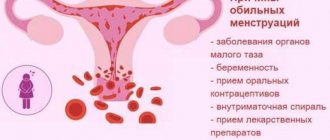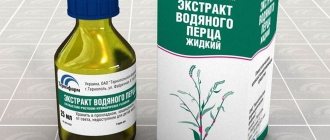how to restore the menstrual cycle Heavy periods occur in women of different ages. Delayed help sometimes leads to more serious problems, which is why it is so important to know and control the duration of your menstrual cycle.
Since ancient times, doctors have assessed the regularity of menstruation in accordance with the phases of the moon, but they could not understand their purpose and considered monthly menstruation as a kind of “purification” process.
Throughout history, the attitude towards this physiological process has retained a mystical connotation. Due to deep-rooted myths, some representatives of the fair sex still consider heavy bleeding as a normal or even beneficial phenomenon for their body (removal of toxins, cleansing...).
Women rarely pay attention to fatigue, weakness and deterioration in well-being. And the reasons for this condition lie in the development of anemia and iron deficiency, which occurs as a consequence of menstrual bleeding. And only when they feel a serious threat to their health do they consult a doctor.
The volume and duration of menstruation is very individual; heavy periods occur in one third of women of reproductive age. At the same time: ♦ in some cases they begin on time, but are stronger than usual, and are accompanied by the release of blood clots; ♦ in others, the amount of blood lost remains the same, but the duration of the period of bleeding per menstrual cycle increases to more than 7 days, and the intervals between menstruation are significantly shortened.
Medications for heavy periods: what can help?
Unfortunately, not all women have easy and painless periods. Almost every woman has experienced heavy or prolonged menstruation at least once in her life. Some people experience heavy periods once a year, while for others it is a regular occurrence. Why this happens and how to help in such a situation will be discussed in our article.
Causes of heavy menstruation
Before discussing possible treatment options, it is necessary to understand why heavy menstruation or, scientifically, menometrorrhagia occurs. There can be many reasons for this. Many of them do not require symptomatic treatment with hemostatic drugs, but serious examination and special therapy.
So, the possible reasons for heavy periods:
- Stress and emotional overstrain can cause heavy periods, but in this case this phenomenon will be a one-time occurrence.
- Climate change, extreme heat, and time zone changes disrupt the biorhythms in the body and can cause bleeding.
- Colds, acute respiratory viral infections, high fever, especially while taking aspirin or drugs of the paracetamol or ibuprofen group. Fever itself suppresses the blood coagulation system, and non-steroidal anti-inflammatory drugs additionally “thin” the blood.
- Incorrect use of gynecological hormonal drugs, their independent prescription without the supervision of a doctor. Often, heavy periods occur “on withdrawal” after improper use of combined contraceptives or gestagens.
- Blood coagulation pathology itself: platelet deficiency, congenital or acquired defects of the blood coagulation system, lack of vitamin K or calcium.
- Diseases of the female genital area: uterine fibroids (especially with submucous nodes), endometrial pathology (hyperplasia or polyposis), adenomyosis or internal endometriosis, chronic endometritis or salpingitis.
Sometimes menometrorrhagia is hereditary and is, in a way, an individual characteristic of a woman. Only by eliminating all of the above pathologies does the doctor have the right to prescribe symptomatic treatment for heavy menstruation in such patients.
Hemostatic drugs for heavy periods
Medicines from this group can be divided into four groups:
Herbal preparations.
These hemostatic agents include herbs:
- nettle,
- shepherd's purse,
- yarrow,
- water pepper
The first three herbs are sold in pharmacies in the form of dried leaves and stems. A decoction is prepared from them and taken for several days.
To prepare a decoction, you usually take a tablespoon of raw material per half liter of boiling water, leave for 30 minutes and take in small portions throughout the day.
Water pepper is sold in pharmacies in the form of an alcohol tincture, which is taken 1 teaspoon 3-4 times a day. The course of treatment is 3-5 days.
General hemostatic drugs.
This is a fairly large group of drugs, each of which affects one or another stage in the blood clotting process.
These include Vikasol, Etamsylate, Aminocaproic acid, Tranexam. The most commonly used at home are Etamzilat or its analog Dicynon and Vikasol, an artificial analogue of vitamin K. Etamzilat is taken 1 tablet three times a day, Vikasol - 1 tablet twice a day.
The course of treatment is 4-5 days. It is important to know that the duration of such hemostatic therapy at home cannot last more than 5 days. If uterine bleeding has not stopped within the specified period, you must immediately consult a doctor! Further delay could be life-threatening.
Drugs that contract the uterus are classified as hemostatic drugs of a “gynecological profile.” These include drugs of the oxytocin and methylergometrine group.
The essence of the action of these drugs is the contraction of the uterine muscle and mechanical compression of the vessels of the uterus. This group of drugs is prescribed in injections or tablets, but only after a preliminary examination by a doctor.
Medicines are dispensed from pharmacies strictly according to prescription.
Hormonal drugs
.
This group includes estrogen drugs, gestagen analogues and combination drugs. They are also prescribed only with a doctor's prescription based on the specific situation.
When prescribing a particular drug, the doctor takes into account the patient’s age, her state of health, gynecological pathology, duration and nature of heavy menstruation.
- Pure estrogens (estrogen valerate) as part of the drug Proginova.
- Progestogen analogues (Duphaston, Norkolut, Levonorgestrel as part of the Mirena intrauterine system).
- Combination drugs are most often used in the form of combined oral contraceptives, for example, Jeannine, Regulon or Lindinette-30. These medications, in addition to the traditional contraceptive, have a special hemostatic regimen.
I would like to note that, as a rule, hormonal drugs to stop bleeding are the last resort after symptomatic therapy. Often their purpose implies further continuous use.
For example, the Mirena IUD gives a good effect in case of heavy menstruation against the background of endometrial pathology and is inserted into the uterine cavity for 5-7 years. Combined contraceptives, after bleeding has stopped, can be taken further according to the usual regimen for several years.
In women aged about 50 years, gestagen therapy on a continuous basis until menopause can be an excellent alternative to curettage of the uterine cavity.
Iron supplements for heavy periods
Heavy periods, in addition to obvious discomfort, are also fraught with large blood losses and lead to the development of anemia. Therefore, every woman suffering from menometrorrhagia must undergo a general blood test to monitor hemoglobin levels and blood from a vein to measure serum iron and ferritin levels.
If any of these indicators decreases, it is recommended to take iron supplements.
The pharmacological market now has a huge selection of all kinds of iron preparations of varying composition, type and cost. The doctor may recommend this or that drug to the patient. It is important to know that the treatment course is at least 3 months. And if bleeding continues, iron supplements should be taken systematically.
It is also important to include foods rich in iron in your diet, as well as protein and vitamin C, which help in the absorption of iron. The leaders in iron content are:
- beef liver,
- language,
- beef and other red meat,
- buckwheat grain,
- apples,
- grenades,
- black currant.
Alexandra Pechkovskaya, obstetrician-gynecologist, especially for Mirmam.pro
Source: https://mirmam.pro/planirovanie/ovulyatsiyamenstruatsiya/lekarstva-pri-obilnoj-menstruacii
Treatment methods
It is important to consider that when anemia is quite severe, it may be associated with serious pathologies of the reproductive system:
- Myoma.
- Ovarian dysfunction.
- Oncological diseases.
Therefore, treatment should be carried out depending on the underlying cause of the disease. First of all, for anemia you need:
- Reduce the amount of discharge.
- Replenish lost hemoglobin. For this, it is recommended to take the following drugs: Fenyuls, Ferretab, Totema, Sorbifer.
These medications are sold without a prescription and help with mild forms of the disease. Medicines contain iron and other components that enable it to be better absorbed.
Attention! Only your doctor can prescribe medications for anemia. You cannot do this on your own; perhaps this remedy is not suitable for you.
are administered intramuscularly .
It is worth noting that these are general strengthening drugs that allow iron to be absorbed faster and improve immunity.
To prevent blood loss, you need to take Tranexam, Vikasol, Dicynon, Etamzilat, Diferelin.
Medicines help increase the viscosity of biological fluid, the density of vascular walls, and prevent their destruction. After a course of therapy, the abundance of menstruation normalizes.
It is important to supplement the treatment with a special diet containing foods rich in iron:
- Beet.
- Red meat.
- Sea kale.
- Apples.
- Buckwheat.
All these products cannot be consumed with dairy, otherwise iron will not be absorbed.
So, anemia during menstruation may not immediately make itself felt, but you always monitor all symptoms and well-being. If you lose a lot of blood each menstrual cycle, your hemoglobin decreases even more, and this is dangerous for your health. In some situations, inpatient treatment is required. At the first symptoms, seek help from a gynecologist or therapist. You should not self-medicate or uncontrollably take medications that can seriously affect the condition of the body. It is especially important to eat right; in most cases, your well-being depends on this.
Every woman should understand that menstruation largely depends on the health of the reproductive system, chronic diseases and the general condition of the body. Sometimes periods can seriously affect a woman's health. Some girls suffer from severe iron deficiency anemia. What is the reason? How to survive menstruation without health consequences?
You can take iron during your period
The nature of menstruation largely depends on general health and existing diseases. But how the critical days pass can also affect a woman’s health. And a disease such as anemia during menstruation can worsen in its manifestations, as well as give menstruation other characteristics.
Read in this article
What is anemia
Anemia is a noticeable deficiency in the blood of hemoglobin, which supplies oxygen to the tissues.
Iron deficiency can occur for various reasons, including systemic diseases, postoperative conditions, and the inability of the gastrointestinal tract to absorb nutrients. In women, anemia is most often recorded due to heavy periods.
If she loses more than 50 ml of blood per day during menstruation, she has to endure this for longer than 7 days and use a fresh pad more often than once every 3-4 hours, the occurrence of the disease is inevitable.
It has the following manifestations:
- Paleness of the skin and mucous membranes;
- Weakness to the point of fainting due to low blood pressure;
- Constant desire to go to sleep, even immediately after waking up;
- Deterioration of hair and nails;
- Decreased appetite and the appearance of unusual food cravings (desire to eat chalk, soil).
The effect of anemia on the cycle
The regularity of the menstrual cycle is ensured by a sufficient amount of hormones: follicle-stimulating, luteinizing, estrogen, progesterone. Their concentration changes at each stage. A deficiency of substances at any stage of the cycle leads to a delay in menstruation; with anemia, this type of disorder occurs quite often.
This is typical for those who have suffered from the disease for a long time and do not make any efforts to combat it. As a result, not only the functioning of the reproductive system, but also the thyroid gland and the central nervous system is disrupted in the body.
The body is so depleted that, along with the diagnosis of anemia, the absence of menstruation can occur for several months.
In many cases, if you have lost your period after being diagnosed with anemia, it is caused by a deficiency of nutrients, and not by the body's inability to absorb them. This is familiar to girls who adhere to a strict unbalanced diet, or rather the absence of meat and fish in the diet. Sudden weight loss always leads to severe hormonal imbalances, which then take longer to treat than they are acquired.
Features of menstruation with anemia
Anemia during menstruation can significantly complicate its course. PMS and all its symptoms, including pain, intensify.
From the beginning of menstruation itself, weakness increases and appetite decreases, although in healthy women it increases at this time. A distinctive symptom that characterizes anemia observed during menstruation is shortness of breath.
It can bother a woman even in complete rest, and it can increase with increasing physical activity.
The nature of discharge during anemia is determined by the characteristics of the blood composition. The number of red blood cells is reduced. In addition, there is a deficiency of vitamins C and B in the body, which weakens blood vessels. This determines what kind of menstruation you have with anemia.
As a rule, they are intense, liquid in consistency, but with clots. The color of the discharge is bright red due to the presence of a large amount of blood. Menstruation can last over 7 days, and its abundance does not decrease even at night.
Manifestations of the disease after critical days
Anemia after menstruation can increase symptoms. If the manifestations were not very strong before, blood loss from menstruation will lead to
- Dizziness;
- Loss of strength and performance, inability to concentrate;
- Lack of appetite and the occurrence of digestive disorders (bloating, constipation, belching);
- Aching in the joints of the arms and legs;
- An increase in body temperature slightly above 37 degrees;
- A feeling of dry mucous membranes, which is especially strong in the vagina, as well as burning and itching of the perineum.
Treatment
Severe anemia rarely occurs as an independent disease.
More often, this is a manifestation of another illness, which may be associated, among other things, with problems in the reproductive sphere: fibroids, endometriosis, ovarian dysfunction, even cancer.
Therefore, therapy should consist primarily of efforts and means aimed at getting rid of them. But anemia during menstruation requires special attention; treatment in this case should ensure a reduction in the abundance of discharge, and therefore blood loss.
It is also important to compensate for the hemoglobin deficiency that has increased during menstruation. The latter can be done by taking medications:
These are over-the-counter medications that help with mild illness. They contain iron and substances that promote its absorption. Treatment with them lasts more than one month, the prescription makes sense based on the analysis and recommendation of the doctor.
Self-selection may be inaccurate if the drug is not suitable for a particular woman. You can inject folic acid, vitamin B12 or Combilipen intramuscularly.
These are general strengthening agents that also promote the absorption of iron and increase immunity.
All these drugs increase the viscosity of biological fluid, as well as the density and elasticity of the vascular walls, which prevents their destruction and the splashing of blood. The abundance of discharge will return to normal, and the period of critical days may also be reduced.
Source: https://UziMaster.ru/vo-vremja-mesjachnyh-mozhno-prinimat-zhelezo/
Gynecologist-endocrinologist: Women often mistake signs of iron deficiency for the onset of menopause
DOSSIER "KP". Oksana Ledoshchuk, gynecologist-endocrinologist, work experience in the specialty - since 1989.
Graduated from Blagoveshchensk State Medical Institute. She has repeatedly improved her qualifications, including at the Scientific Center for Obstetrics, Gynecology and Perinatology of the Russian Academy of Medical Sciences (Moscow). She worked in obstetrics and gynecology departments, and since 1995 - a gynecologist-endocrinologist. From 2008 to 2013 - organization and work in the city office of menopause pathology of the Minsk City Gynecological Hospital. Member of the Association of Gynecologists-Endocrinologists of Russia, member of the Russian Menopause Association.
Works in a private medical center in Minsk.
– Oksana Borisovna, many have heard about anemia and the benefits of iron. But if hemoglobin is normal, people do not suspect that they can live with hidden iron deficiency, which reduces immunity, performance, and leads to the development of chronic diseases .
– Iron performs vital functions of the body, which cannot produce it itself and receives it from food.
This microelement transports oxygen to tissues, provides cells with energy, participates in the process of hematopoiesis, is necessary for the synthesis of liver enzymes involved in the destruction of toxins, regulates immunity and increases body tone, takes part in the process of cell division, participates in DNA synthesis, and is necessary for the synthesis of hormones thyroid gland.
An obvious lack of iron is manifested by changes in the general blood test - the level of hemoglobin and red blood cells decreases. But there is also a hidden deficiency - when, with normal general blood test results, the level of iron in the blood serum (hidden or serum iron) and ferritin (an indicator of iron reserves in the liver) are low.
– Who is more likely to experience these declines?
– Anemia can be caused by an increased need for iron during rapid growth in children and adolescents, during pregnancy and lactation, poor nutrition, including exclusion of meat from the diet, lack of vitamins, various diseases of the gastrointestinal tract in which iron absorption is impaired, obvious and hidden bleeding (heavy, prolonged menstruation, bleeding from hemorrhoids, stomach or duodenal ulcers, tumors of the gastrointestinal tract).
Complaints due to iron deficiency are different: headaches, mainly in the evening, a feeling of lack of air, rapid heartbeat, flies before the eyes, dry mucous membranes and skin, sore throat, cracks in the corners of the mouth, brittle nails and hair, their loss, drowsiness during the day and poor sleep at night, decreased memory and attention, increased fatigue, decreased performance, psycho-emotional instability, nervousness and even depression.
There are quite a lot of patients with such complaints; they do not understand what is happening to them. The above complaints accompany many diseases, sometimes patients begin to go in circles - psychotherapists, psychologists, personal growth groups, “specialists in removing damage and cleansing the aura”...
Complaints due to iron deficiency: headaches, mainly in the evening, feeling of lack of air, rapid heartbeat, flies before the eyes, dry mucous membranes and skin, cracks in the corners of the mouth, brittle nails and hair, their loss.
Similar complaints occur with chronic nicotine intoxication. But who said that smoking does not lead to iron deficiency? The liver suffers, since it is the body’s defense against toxins.
Often with anemia, food preferences change - you want liver, some foods with blood. A sign of hidden anemia may be a sudden urge to urinate and the inability to hold urine when laughing or coughing.
This may indicate a lack of iron in the muscles.
“The first thing to do with such complaints is to rule out thyroid dysfunction, vitamin D and iron deficiency.”
– Anyone who has graduated from medical school knows well that a detailed conversation with the patient is half the success in making a diagnosis. Don't say, “What do you want at your age? We're all tired!" – and ask about lifestyle, nutrition, work, family history. And definitely about complaints.
Patients don't know how to complain. They immediately lay out a stack of tests, often done chaotically, with the words: “I have low this, high that...” But there is nothing autonomous in the body.
Based on the above complaints, first of all, I can assume that the patient has hormonal dysfunction of the thyroid and gonads, vitamin D deficiency, and iron deficiency.
It is necessary to pay attention to the characteristics of the patient’s menstrual cycle (regularity, duration, abundance).
Normally, blood loss during menstruation should be 80 milliliters per day, this is 3 to 4 medium pads, the duration of bleeding should be no more than 7 days. Some believe that the more abundant the menstruation, the more beneficial it is; the woman is “cleansed.” This is wrong.
In adult women, bleeding can be associated with various diseases of the female reproductive system (uterine fibroids, ovarian fibroids, endometriosis, endometrial hyperplasia and polyps, cervical diseases, oncological processes).
Bleeding can develop against the background of hormonal dysfunction, which can often be observed in teenage girls, obese women of all ages, and in chronic inflammatory processes.
The body of young girls experiences an increased need for iron due to rapid growth. During the same period, the formation of the menstrual cycle takes place (about one to two years); there are often disturbances in the form of delays with subsequent bleeding or, conversely, frequent (several times a month) or long-term, for several months.
A sign of hidden anemia may be a sudden urge to urinate and the inability to hold urine when laughing or coughing. This may indicate a lack of iron in the muscles. herworld.com.
Stressful situations associated with study increase the manifestations of hormonal disorders. You need to be able to not only study well, but also give your body a rest, including sleep. The duration of night sleep in adolescents should be 7–8 hours, since sleep disturbance also leads to impaired ovarian function or enhances existing one. It is important to observe and talk with the child.
Often mothers do not attach any importance to the fact that the girl has frequent, heavy or prolonged bleeding. In my practice, there was a case when a 15-year-old girl had uterine bleeding that lasted from March to October, and her mother could not clearly explain why they did not see a doctor for so long. The girl turned out to have a serious hormonal problem, which required hormonal therapy.
“Iron absorption is impaired due to inflammatory diseases of the gastrointestinal tract”
– I see patients with anemia every day, only today there were four women with complaints of bleeding. Moreover, one of them has been treating anemia with a therapist for four years, but no one asked her about the nature of her menstruation.
Iron enters the body with food. When 10–20 mg of iron is taken from food per day, only 10% is absorbed. Iron from animal products is absorbed by 15–35%, and from plant products by 2–20%.
Iron is found in meat and offal (more in dark meat), seafood, fish, eggs, bread and cereals (oatmeal, buckwheat, barley). Wheat bran and rye, legumes, vegetables, and herbs contain a lot of iron.
Among the berries and fruits, it is useful to eat dogwood, persimmon, plum, apples and pomegranates. Iron is found in seeds and nuts, figs, prunes, raisins, and dried apricots.
–I read that even a healthy person may not be able to absorb iron if they drink it with coffee, tea, milk or eat cottage cheese..
– Recently, attitudes towards dairy products have changed. They used to be considered super useful, but now experts advise limiting them. It turns out that milk greatly increases insulin.
This is a hormone that is responsible for the development of type 2 diabetes, obesity, and menstrual irregularities. With age, milk is less digestible and should be limited. And yes, it is not recommended to take iron-containing foods with milk. For example, buckwheat is healthy, but with milk it’s not.
And it’s better to eat it in the morning so that carbohydrates are not stored in excess fat tissue. In the evening it is better to eat meat with vegetables.
In recent decades, avoidance of meat consumption has become widespread. Unfortunately, this causes many people to have low iron levels in their blood. badfon.ru.
In recent decades, avoidance of meat consumption has become widespread. Unfortunately, this causes many people to have low iron levels in their blood. This is everyone’s choice, but in this case you need to monitor your blood condition, take additional iron supplements, other vitamins, microelements, and iron-containing foods. My daughter also hasn’t eaten meat for more than 5 years, since she was 15.
My husband and I did not interfere with this, we discussed all the possible consequences for her body, and explained how she should behave in this situation. Control tests that we conduct twice a year show that she is coping with this.
– Nowadays, the fact that iron and other microelements are not absorbed is often blamed on Helicobacter - a harmful bacterium that can only be killed by a strong course of antibiotics…
– Yes, impaired iron absorption often occurs due to problems with the gastrointestinal tract. Gastroenterologists identify and treat this pathology.
Iron absorption is impaired due to inflammatory diseases of the gastrointestinal tract, in obese people after bariatric therapy (reducing the volume of the stomach through surgery).
Worm infestations also lead to iron deficiency in the body, especially in children. This is caused by the fact that parasites feed on microelements and the blood of the host.
– Sometimes doctors cannot find the cause of anemia, but it is necessary to simply check the function of the thyroid gland; anemia often develops with hypothyroidism. Svyatoslav ZORKY
“Anemia often develops with hypothyroidism”
– Anemia can develop against the background of hidden bleeding. First of all, these are diseases of the gastrointestinal tract (erosions and ulcers of the stomach, duodenum, chronic hemorrhoids, tumors), which can be asymptomatic for a long time. Therefore, it is important to test feces for occult blood.
Inflammatory diseases of the urinary tract and kidney stones can also provoke hidden bleeding. Cancer patients also suffer from iron deficiency. Iron loss is sometimes associated with medications - these are glucocorticoids, which are taken for various autoimmune diseases.
Sometimes doctors cannot find the cause of anemia, but it is necessary to simply check the function of the thyroid gland; anemia often develops with hypothyroidism.
Deficiency of B vitamins, including folic acid and vitamin B12, also contributes to the development of anemia. There are also violations at the genetic level.
Also, in people who are obese and take insulin-lowering medications for a long time, vitamin B12 levels decrease. And this also leads to anemia.
– If iron deficiency is detected, how quickly can it be brought back to normal?
– To replenish it, you need to take iron supplements for three or more months, but always under the control of tests. This is a long process. Naturally, at the same time, the cause leading to blood loss is treated.
–I read that iron is also actively lost in men - with sweat, including during active sports...
– Like all microelements. Sweating, by the way, is characteristic of many diseases. For example, with hypofunction of the thyroid gland.
Many mature women mistake this condition for “hot flashes”, consider it normal and miss the onset of the disease, when they can get by with a minimum of medications. I don't like drug-induced aggression.
The teachers at the institute taught us that no more than three, maximum five, drugs should be prescribed at a time. Including vitamins.
In fact, our conversation today is primarily about lifestyle, nutrition and health. Therefore, you should never think that you have nothing serious and “it will go away on its own soon.” It is important to contact a specialist without delay and work together to resolve the problem at an early stage.
Iron supplements during menstruation
> Medicine
Researchers from the Swiss Federal Institute of Technology Zurich (Eidgenössische Technische Hochschule Zürich) conducted two studies to determine the effect of taking iron supplements on women during menstruation, and to determine which dosage is most effective for iron absorption. The results were published on October 9, 2021, in The Lancet.
The studies included iron-depleted women (serum ferritin ≤ 25 μg/L) with no or mild anemia. All of them were aged between 18 and 40 years and received labeled iron (II) sulfate.
The authors assessed the bioavailability of iron from the drug by measuring the number of isotopes in red blood cells 14 days after the last dose, as well as the level of serum hepcidin, an oligopeptide that reduces the absorption of iron in the small intestine.
The first study included 40 participants who were divided into two groups (21 and 19 women). The subjects of the first group took 60 mg of iron (II) sulfate daily for 14 days. The second group took the drug at the same dosage on menstrual days for a total of 28 days.
The scientists found that in the second group, iron absorption was better and averaged 21.8% versus 16.3% in the first group. In addition, it turned out that with daily continuous use, the production of hepcidin, which interferes with the absorption of iron, significantly increased.
The second study involved 20 women. The first group of subjects took the drug at a dose of 120 mg once a day for three days. In the second group, the same dose was divided into two doses. 14 days after the last dose, the groups were changed.
As a result, it became possible to make comparisons for each participant. No significant differences in iron bioavailability were found between the two dosing regimens.
However, double dosing increased serum hepcidin concentrations, which may adversely affect iron absorption with long-term dosing.
Based on their results, the authors conclude that it is better for women to take iron supplements once a day on menstrual days. It is now necessary to confirm these results in a group of patients with iron deficiency anemia.
Source:
Found a mistake? Select the text and press Ctrl+Enter.
Unfortunately, not all women have easy and painless periods. Almost every woman has experienced heavy or prolonged menstruation at least once in her life. Some people experience heavy periods once a year, while for others it is a regular occurrence. Why this happens and how to help in such a situation will be discussed in our article.
How does anemia manifest after menstruation?
The woman feels overwhelmed and suffers from the following unpleasant symptoms:
- Prostration.
- Dizziness.
- Loss of performance.
- Inability to concentrate.
- No appetite.
- The functioning of the digestive system is disrupted - constipation appears, the stomach becomes very bloated, and belching appears.
- Aches in the joints of the legs and arms.
- The temperature may rise above 37 degrees.
- The mucous membranes in the mouth and vagina dry out.
- The perineum burns and itches.
Iron supplements and menstruation
- Hemostatic drugs for menopause
- Use of hemostatic agents during (menstruation) menstruation Vikasol during menstruation, menstruation, when to use, pros and cons of use
- Etamsylate, a menstrual hemostatic agent
- Tranexam, a hemostatic agent for menstruation
- Diferelin during menstruation, composition, effect of the drug
- Ascorutin for heavy periods
- Trinixan, a hemostatic drug for menstruation
Uterine bleeding can occur in women of any age. However, the risk of its occurrence is highest during menopause. As a result of strong hormonal changes, menstrual flow during menopause may periodically be either absent or very heavy. In order to restore balance, many women begin taking hormonal medications.
Disruptions in the menstrual cycle, characterized by various abnormalities, are usually observed at the beginning of menopause. With the onset of menopause, menstrual flow should stop completely. If a woman’s menopause is accompanied by vaginal bleeding, the development of diseases of the reproductive system should be suspected.
Use of hemostatic agents during (menstrual) menstruation
The question of which medications to use for heavy periods is very common and difficult. Despite the fact that everyone's body structure is the same, each person is individual. In particular, if it concerns the functioning of the body. Thus, many women during their menstrual periods experience serious inconvenience due to heavy bleeding.
However, you should not take any medications on the recommendation of friends. Since there is usually no benefit from self-medication, a doctor must prescribe medications. The reason for this ban is quite simple. Each person has an individual body structure, and therefore medications are prescribed strictly individually.
Since it is important to take into account the duration of the entire cycle, as well as the abundance of discharge.
Some representatives of the fairer sex should not at all stuff themselves with medications.
It is enough to drink infusions of herbs, which act on the body in two directions at once - they increase blood clotting, and will also help to narrow blood vessels. This method of eliminating bleeding is especially suitable for women suffering from allergic reactions to synthetic drugs.
Knowing the characteristics of her body, a woman can begin to take such herbal infusions a few days before the onset of menstruation, which will significantly reduce the possibility of heavy bleeding, as well as improve well-being during such a painful period. And this will act as a tonic.
If you still need to use medications, contact your doctor before taking them.
The article discusses separately many effective hemostatic drugs for heavy menstruation, the choice of drug to stop heavy bleeding during menstruation, and the features of the use of each specific drug.
Some of the most common medications used to stop bleeding include the following:
- Vikasol;
- Etamsylate;
- Dicynone;
- Impedil;
- Cyclonamine;
- Ezelin;
- Aglumin;
- Dicynone;
- Tranexam;
- Diferelin;
- Ascorutin;
- Trinixan.
Below you will learn more about which hemostatic drugs can be used for heavy menstruation.
Vikasol for menstruation, menstruation, when to use, pros and cons of use
An analogue of vitamin K, only in synthetic form, is Vikasol. This vitamin helps blood clot, thus preventing excessive blood loss. Vikasol has a wide range of effects during menstruation, including it is often used for heavy bleeding in women during the menstrual period.
Since this drug was produced a very long time ago, and pharmacists classify it as an old-generation medicine, it is not suitable for every woman. Vikasol is suitable as a first aid remedy, especially if there are no other remedies at hand. However, it is not recommended to take more than 2 tablets per day.
Do not use tablets for thromboembolism and high blood clotting. Side effects often include toxicosis. Therefore, you should treat this drug with extreme caution.
Etamsylate, a menstrual hemostatic agent
A way to reduce heavy periods is to use Etamsylate. Etamsylate during menstruation and heavy periods is good because it does not form clots, and it creates a hemostatic effect.
Among the main prohibitions when using this drug are bleeding that was provoked by the presence of thrombosis or embolism.
Despite the fact that no obvious contraindications have been identified for this drug, there is still no need to take it uncontrollably.
Tranexam, a hemostatic agent for menstruation
Tranexam is a hemostatic drug for heavy menstruation. The fibrinolysin inhibitor underlies such a hemostatic agent as Tranexam. The drug has a local effect and is often simply irreplaceable.
Tranexam has a number of positive characteristics, including it is an antiallergic agent. Tranexam is available as an injection or tablet. Contraindications to the use of the drug: subarachnoid bleeding, intolerance to some components of the drug.
It can be used, but only after consulting a doctor in case of thrombosis, kidney failure, or vision problems.
Among the side effects of the drug Tranexam are the following: weakness, dizziness, interruptions in heart function, allergies, etc. Medicines are dispensed from pharmacies only upon presentation of a prescription. If the bleeding is caused by fibroids, then it is better to find another treatment option.
Diferelin during menstruation, composition, effect of the drug
A medicine identical to gonadotropin-releasing hormone is Diferelin. It should also be classified as an antitumor drug. This remedy regulates bleeding at a sensitive level. They can control bleeding at the receptor level. And also for fibroids and endometriosis.
Source: https://karma-laws.ru/preparaty-zheleza-i-menstruacija/
How does anemia manifest after menstruation?
The woman feels overwhelmed and suffers from the following unpleasant symptoms:
- Dizziness.
- Loss of performance.
- Inability to concentrate.
- No appetite.
- The functioning of the digestive system is disrupted - constipation appears, the stomach becomes very bloated, and belching appears.
- Aches in the joints of the legs and arms.
- The temperature may rise above 37 degrees.
- The mucous membranes in the mouth and vagina dry out.
- The perineum burns and itches.











